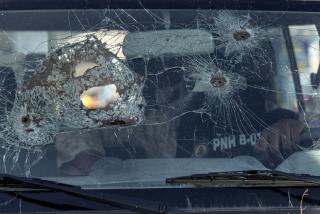Japan Sending Troops to Zaire to Aid Refugees
- Share via
TOKYO — After an agonizing two months of study, the government of Prime Minister Tomiichi Murayama on Tuesday finally approved sending Japanese troops to provide humanitarian assistance to Rwandan refugees in Zaire.
The dispatch will mark the fourth time since the end of World War II that Japan has sent troops overseas, underscoring a new--although fumbling--commitment to involve its people in foreign trouble spots.
Although Japan gave $13 billion in support of the Persian Gulf War in 1991, it sent no personnel to the Mideast during the fighting. Only after being stung by foreign criticism of its “checkbook diplomacy” did the country enact a peacekeeping-operations law to systematize dispatches of noncombat troops to join U.N.-sponsored missions.
The dispatch of troops to Zaire will be the first under Murayama, chairman of the Socialist Party, which just two years ago virulently opposed passage of the peacekeeping-operations law.
Japan announced July 25 that it would provide $32.3 million in aid for Rwandan refugees, but three different missions, one after another, were sent to inspect refugee camps, delaying for seven weeks the decision to send troops.
Murayama’s Cabinet decided to assign 380 soldiers, airmen and military doctors and nurses to transport medicine and relief goods, dig wells and provide 24-hour medical assistance mainly at refugee camps in and around Goma, Zaire. An additional 100 troops in Japan will be assigned to support the mission.
Although U.S. troops have left the region and French troops are withdrawing, about 800,000 refugees remain in the camps near Goma where tens of thousands have died since fleeing Rwanda.
An advance party will leave Saturday, with the main body of troops departing Sept. 30.
Worries that the troops might inadvertently get involved in fighting remained so pervasive that the Cabinet spelled out precisely the weapons the troops would be permitted to take with them: 79 pistols, 163 rifles and one machine gun to be mounted on an armored command-and-communications vehicle. It also forbade the troops from entering Rwanda.
In 1990, Japan, whose postwar constitution bans the use of force in settling international disputes, dispatched a mine-sweeping mission to the Persian Gulf after U.S.-led troops swept Iranians out of Kuwait--its first post-World War II overseas involvement. Twice since Parliament passed the peacekeeping law, Japan has sent small bands of troops abroad--to Cambodia and Mozambique.
Two Japanese were killed while 600 Japanese soldiers built and repaired roads for one year in Cambodia.
More to Read
Sign up for Essential California
The most important California stories and recommendations in your inbox every morning.
You may occasionally receive promotional content from the Los Angeles Times.













